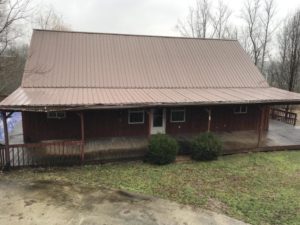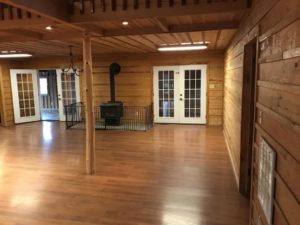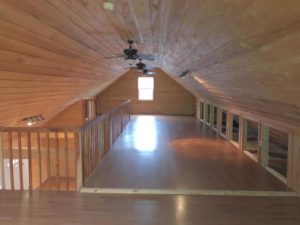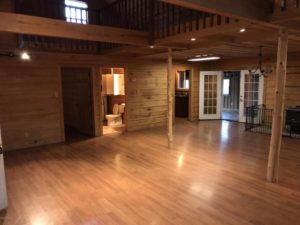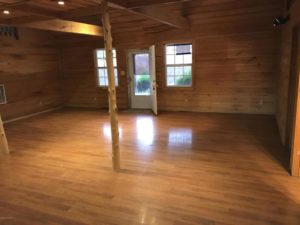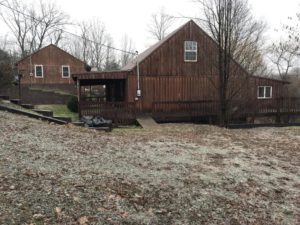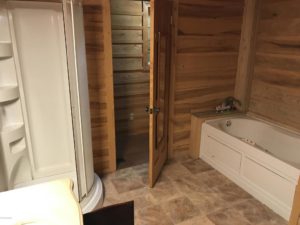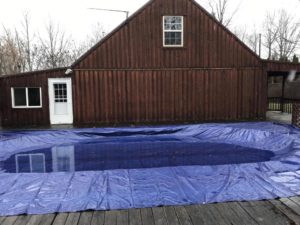CASE STUDY: A Behind-the-Scenes Look At Representing a Buyer on a HUD House during the COVID-19 Scare
May 22, 2020 was the end of one journey and the beginning of another. I first talked to Dave in early February. We met a later that day and quickly assessed what he wanted in his new home. Unlike many first-time buyers he was familiar with the buying process having bought several homes in other states but was new to Kentucky and needed my help exploring different areas as he traveled a lot for work and had many options. Envoy Mortgage had him quickly pre-approved with several options. We saw a couple of homes before finding this 2000sf hand-built cabin on an acre lot. It was a HUD foreclosure with an asking price of $80,000.
HUD homes are FHA foreclosures that the government has paid the mortgage insurance claim to the lender and now need to liquidate. If $80,000 sounds ridiculously cheap for a cabin on an acre lot near a 127 acre lake – that’s because it is. When listing HUD homes they seem to target a number that isn’t too low (like auctions that start at a dollar) but makes the price inarguable. HUD homes are done by “blind bidding” like a silent auction. You don’t know what the other parties value the property so you are stuck giving your best offer and hoping it works. This home, like most HUD houses, had restricted bidding to only owner-occupants for the first 10 days. On the 11th day they would review the bids and select the bid with the highest acceptable net proceed.
When we viewed the property, there were a lots of other buyers. The neighbors told us not only about the house but how many other people had already been coming to see it. It was certainly in high demand. One of the neighbors had expressed having an interest in the home but insisted that it required 25 or 30 thousand dollars to fix it up. This was a concern at first for my client until the fog cleared and it became apparent that the neighbor likely wanted to warn off others so he could ultimately get it for himself.
HUD provides a property inspection report given by a contractor they hire to review the house. They don’t identify specific issues but will do a pressure test to see if the plumbing holds air at 35psi for 10 minutes, if the furnace and AC fans kicks on, if there are any visible leaks in the roof, if the appliances are present and functioning, if the water heater has any visible defects and if the waste system has any readily visible deficiencies. If the plumbing doesn’t hold pressure, they aren’t looking for where the leak is – it is a simple Pass/Fail test.
After reviewing the report, it appeared all was in good condition except the plumbing. We knew that the plumbing wasn’t holding pressure and that a repair would have to be escrowed and completed after closing because HUD does not allow repairs to be done prior to closing and the house has to be habitable in order to obtain the financing. When doing an “Escrow Holdback” most lenders require you to get a written estimate and then bring that amount plus 50% more to the closing (in case they underbid or more work was required once they started). That money is then held by the lender or title company until the repairs are completed. Once they are finished, the lender is notified and the appraiser is sent back out to verify completion. Then they pay the contractor and give any overage back to the buyer.
Dave thought this house would be perfect for his family. It had a big pool, 2 car garage and while it needed quite a bit of work in the form of deferred maintenance, the repairs looked very manageable and in his wheel-house so he could do most of the improvements himself. We ultimately wrote the offer for $87,770 with no closing costs. The thought process was that if someone else bid $90k and needed closings, we would still net a higher amount and have our offer accepted. The market was competitive and it was easy to see the value in the house knowing it sold 6 years earlier for $161,000. I submitted the offer on HUDhomestore.com and waited.
Our offer was accepted and then the work really began. Once they notified us of the acceptance, we had to get the standard $1000 good faith (also called escrow) deposit ready for the title company to hold. Simultaneously, Envoy Mortgage prepared a pre-approval letter with the property address and exact purchase price. These letters also have to be dated, signed and specifically state that credit and supporting income documents have been reviewed. Everything with HUD is centered around their HUD case number (201-xxxxxx) so we made sure that was on both the check as well as the pre-approval letter.
HUD does their paperwork electronically (finally!) no more overnight deliveries. Two days passed before they emailed the contract package to me and then to Dave for e-signatures. I met Dave and picked up the check and drove it to Lawrenceburg to drop off with Kenny Hawkins’ broker. Kenny is a genuinely nice guy and I’ve always enjoyed our cross-sales. Two days later, we received an executed package and were officially under contract and our 45 day deadline to close had begun. HUD is a stickler for deadlines and they typically enforce a $25 per day fee for extending the deadline – even if it is the fault of the lender (this is another reason it is important to work with a lender that is familiar with HUD deals – they are truly a different animal).
HUD is VERY controlling over when utilities can be on at a property and coordinating the times can be a headache if working with the inspectors and appraiser to get it all done inside of the 3 days they allow. Dave filled out the request for the water and electric to be turned on and had to specify which 3 days he wanted it on. Dave coordinated with the electric company to turn on power for the day we were to meet. It was nice that the power company did it all remotely and no one needed to meet at the house for activation. The Field Service Management (FSM) did not allow the water to be activated since there was a known leak. We also had Envoy Mortgage order for the appraisal to be done during the same window that the power was to be on.
We had a 15 days to do an inspection. I provided a few names of inspection companies to my client, but Dave is very well-versed in construction and maintenance and decided to conduct his own inspection. I met Dave, his fiancé and daughter at the property to perform a once-over. HUD has an addendum in regard to the inspection that limits the items you can cancel the contract for (undisclosed structural, roof, system defect, or non-compliance with local codes, zoning or building requirements or if radon levels are too high) says they must concur with the inspection report findings in order for a buyer to receive their deposit back. In any event, Dave knew if something obscenely wrong was found he could hire a home inspector and cancel based on that person’s findings within the inspection period. After looking at all the systems, they were satisfied that this was what they anticipated and we were moving forward on the purchase. However, we still didn’t know where the leak was that was referenced in HUD’s report.
The appraiser had come to the property early and didn’t get the message to click the power on so the first appraisal was going to be subject to the water and electric being on. We were going to encounter another problem…COVID-19 had just become an issue.
March 13, 2020 saw the entire nation changing as they reacted (and somewhat overreacted) to what they perceived as a global pandemic. Loan guidelines were changing nationwide. Churches were closed. Businesses were closed and unemployment would ultimately spike at nearly 20%. Overnight, grocery cashiers were granted a level of heroism typically reserved for first responders. Governors were urging people to shelter-in-place unless they were an essential worker. Government agencies were shuttered. This was particularly problematic because the title had not come back yet and small towns like where this house is don’t have their records online to do a title search. We had to ask for a 15 day extension and fortunately, HUD waived the extension fee since providing clear title is a Seller obligation.
There were multiple facets of the loan that needed additional documentation, clarification and exceptions in order to still qualify for what was a slam dunk just weeks before. Dave was concerned because there weren’t concrete answers to his questions. Nothing was certain about anything any more. Still, there’s a time to be concerned and we just hadn’t reached it yet. When dealing with uncertain loans, cash can solve a lot of problems. The advice to Dave was to squirrel away as much cash as possible between now and closing. That can solve escrow issues and possible move to another program if the current one was to phase out like many were across the country. Dave was making sure that he communicated with the lender as to not raise red flags on deposits that would cause them to be disallowed. Lenders are really particular about sourcing deposits.
Two weeks passed quickly and the county clerk’s office was still closed. Dave’s fiancé had tracked down someone there and provided a phone number to try to reach them by cell. We still couldn’t get a title search done. Another extension would be needed. On top of it all, the appraisal stated that the utilities needed to be on before the appraisal could be complete and the house needed to be painted. The utilities weren’t a problem and could be verified after closing but the house had been stained and was never painted so the appraiser was incorrect in making it subject to painting. Envoy contacted the appraiser to get it corrected but the appraiser stopped responding to calls. For nearly a month the appraiser was non-responsive and we were quickly running out of time.
At Envoy’s persistence, the appraisal was finally changed to state it only needed to be stained in places that were lacking. Coupled with the plumbing issue we knew about, we went back out to the property to get quotes for our escrow holdback. This entailed doing a pressure test to diagnose where the problem was in the pipes and photographing the exterior for the stain quote. Dave would have the quotes by the next day.
The title company had received the title search back but another 10 days had passed and we were going to need another extension. HUD has an addendum for everything. One of them states that they must be given a 5 day notice once the loan is clear to close (CTC). There was no way to get everything on tract to close by the end of the day so we made a final request. HUD wouldn’t declined to waive the fee this time and Dave was told he would need a $325 cashier’s check ($25 a day x 15 days). I sent email after email to argue the point that the true delay was by the appraiser and the appraiser was ultimately responding (or not responding) to an FHA guideline/rule. Since FHA is governed by HUD, this was ultimately their fault, not the Buyer’s. It was also stressed that HUD failed to disclose that the staining wasn’t present in some parts and would be required for FHA financing. It worked! HUD had just waived the 3rd extension. This is NOT something that is typical but this deal was anything but normal. Note: While HUD deals can be difficult, they have been fair when it comes to added fees and the Buyer or their Lender is not at fault.
We were in the home stretch. Envoy had sent it in for the final underwriting approval. All the other conditions had been made and after the weekend we were finally CTC. We had the title company ask HUD if they could accommodate a 3 day notice and they agreed – probably because we were nearly 40 days past our deadline and everyone just wanted to close the deal.
Finally, the day is here and Dave and is fantastic family were able to close on their home without further delay. The cash to close was a lot less than we thought just 4 weeks earlier as Envoy was able to secure down payment assistance and the escrow holdback was only $1200. The journey that started in February as a 3 hour tour (the younger generation should Youtube Gilligan’s Island for this reference) was finally coming to an end.
Now Dave’s journey begins…


